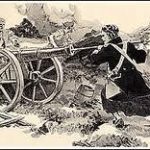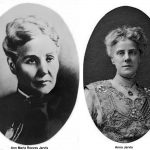Civil War Nurse
Anna Maria Ross was a native of Philadelphia, where she spend the greater part of her life. Her mother’s name was Mary Root, a native of Chester County, Pennsylvania. Her father was William Ross, who emigrated early in life from the county of Derry, Ireland.

Endowed by nature with great vigor and energy, Anna had been remarkably successful in charitable works before the Civil War. Well-known to the public-spirited and humane of her native city, her appeals in behalf of the needy and suffering were never allowed to go unheeded.
On one occasion she was at the house of a friend, when a family was incidentally mentioned as being in great poverty and affliction. The father had been attacked with what is known as “black small pox,” and some members of his own family had left the house from fear of the deadly infection.
The quick sympathies of Miss Ross readily responded to this tale of want and neglect. “While God gives me health and strength,” she earnestly exclaimed, “no man shall thus suffer!”
Due to the central location of the great city of Philadelphia, its extensive lines of transportation, the large military establishments, and its teeming population, the city became a hub of activity as great throngs of soldiers traversed the city to and from the War front from the beginning to the end of the Civil War.
Cooper Shop Hospital
Anna’s work for the soldier was chiefly performed in connection with the institution known as the Cooper Shop Hospital. She was appointed Lady Principal of that institution, and from its opening in May of 1861, devoted herself to it with an energy that never wearied.
Day and night she was at her post – watching while others slept, dressing with her own hands the most loathsome wounds; winning the love and admiration of all with whom she was associated. Her tasks were arduous, her sympathies were drawn upon to the utmost, her responsibilities were great.
Anna was recognized above other nurses due to her strenuous efforts on behalf of her “Boys.” The Cooper Shop was founded mainly through her tireless exertions. In a city famous for its outstanding public and private charities, many inspired by the influence of the Quakers, Anna Ross was distinguished by a kindness of heart and her devotion to good works.
When a soldier was about to leave her care, she inspected his wardrobe and supplied everything he needed for his trip home. It was her custom also to furnish to each one with a sum of money, “that he might have something of his own” to meet any unexpected necessity along the way.
A Soldier’s Friend
For a long time, an Eastern soldier was an inmate of her hospital, and his recovery was slow. When it seemed unlikely that he would soon be fit for service in the ranks, she got him the appointment of hospital steward, and he remained where he could still have care.
After the battle of Gettysburg the soldier relapsed, and from overwork and overwrought feelings, sank into a hopeless depression. The death of a beloved child, and an intense longing to visit his home and family, aided his grief.
It was at this crisis that Miss Ross directed all her efforts toward restoring him to his family. She applied to the captain of a Boston steamer, but he refused to receive a sick passenger on account of the want of suitable accommodations. The case was urgent. He must go or die.
“There is no room,” repeated the captain.
“Give him a place upon the floor,” was the rejoinder, “and I will furnish everything needful.”
“But a sick man cannot have proper attendance under such circumstances,” persisted the captain.
“I will go with him if necessary,” she replied, “and will take the entire charge of his comfort.”
“Miss Ross, I am sorry to refuse you, but I cannot comply with your request. This answer must be final.”
Anna covered her face with her hands for a few moments, then said, “Captain, I have had many letters from the friends of New England soldiers, thanking me with overflowing hearts for restoring to them the dearly loved husband, son, or brother while yet alive. From (this soldier’s) wife I shall receive no such message. This is his only chance of life. He cannot bear the journey by land. He must go by water or die.”
“I will take him, Miss Ross,” was the answer, “but it must be only upon the condition that you will promise not to ask such a favor of me again whatever the case may be.”
“Never!” was the quick reply.
The Soldiers’ Home
As the War progressed and with the increasing demands on the hospital, Anna Ross decided to open a larger hospital, where the weak and sick could remain to gather their strength until able to rejoin their units or continue their journey.
She took it upon herself to find a new place of refuge, raise the needed funds, and operate the facility. She canvassed the city, pleading for donations, going door to door. She traveled throughout Pennsylvania, seeking support, and helped to sponsor a Soldiers’ Home Fair to raise money for the cause.
By December, a suitable building was found for the new facility, and Anna was in the process of furnishing it. Late one evening, a companion suggested that the remaining purchases be delayed until the following day, that many of the stores would be closed.
“Come to South Street with me,” Anna replied. “They keep open there until twelve o’clock, and we may find exactly what we want.”
The long walk was taken, and when the desired articles were bought, Anna finally said, “I am tired, and so cold that I feel as if I never could be warm again.”
Anna’s health broke down. She was already past fifty, and after a life of toil and care for the less fortunate, well past her prime. Despite the valiant efforts of her personal physician, Dr. Nebinger, the medical director of the Hospital and a dear friend, Anna’s health continued to deteriorate.
On the very day that her efforts were to be successful with the dedication of the new Soldiers’ Home and Hospital, Anna Maria Ross died. The day was December 22, 1863.
Her funeral was immense in keeping with the love and esteem her life’s work had earned her. Thousands followed her casket to Monument Cemetery, military units honored her memory, and eloquent eulogies attempted to do her the honor her work had already gained her.
After Anna’s funeral, one of her friends was boarding a streetcar when the conductor said, “I suppose you have been to see the last of Miss Ross.” She nodded in the affirmative. While tears flowed down his cheeks, he said, “I did not know her, but she watched over my wife for four weeks when she had a terrible sickness. She was almost an entire stranger to her when she came and offered her assistance.”
SOURCE
Woman’s Work in the Civil War
Life of Anna Maria Ross





